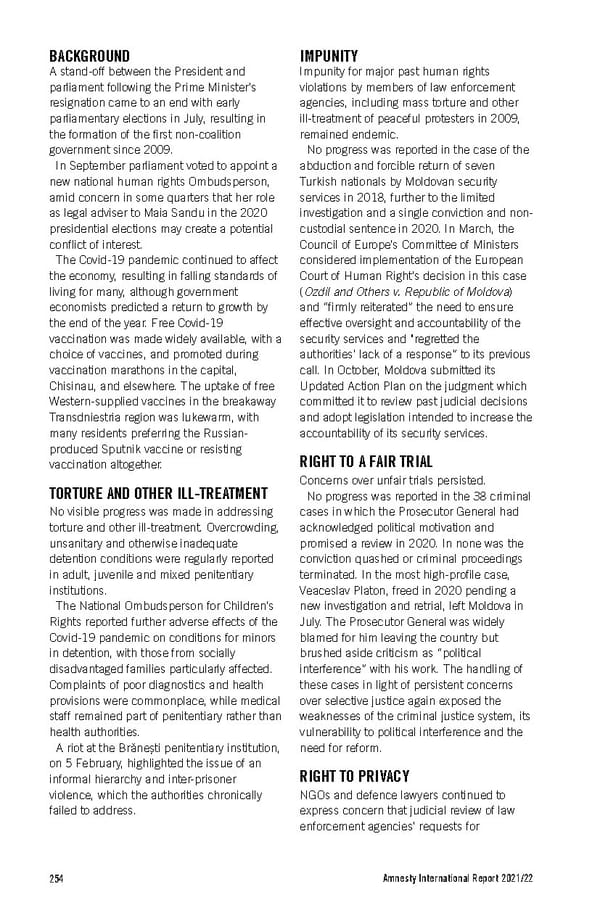BACKGROUND IMPUNITY A stand-off between the President and Impunity for major past human rights parliament following the Prime Minister’s violations by members of law enforcement resignation came to an end with early agencies, including mass torture and other parliamentary elections in July, resulting in ill-treatment of peaceful protesters in 2009, the formation of the first non-coalition remained endemic. government since 2009. No progress was reported in the case of the In September parliament voted to appoint a abduction and forcible return of seven new national human rights Ombudsperson, Turkish nationals by Moldovan security amid concern in some quarters that her role services in 2018, further to the limited as legal adviser to Maia Sandu in the 2020 investigation and a single conviction and non- presidential elections may create a potential custodial sentence in 2020. In March, the conflict of interest. Council of Europe’s Committee of Ministers The Covid-19 pandemic continued to affect considered implementation of the European the economy, resulting in falling standards of Court of Human Right’s decision in this case living for many, although government (Ozdil and Others v. Republic of Moldova) economists predicted a return to growth by and “firmly reiterated” the need to ensure the end of the year. Free Covid-19 effective oversight and accountability of the vaccination was made widely available, with a security services and "regretted the choice of vaccines, and promoted during authorities’ lack of a response” to its previous vaccination marathons in the capital, call. In October, Moldova submitted its Chisinau, and elsewhere. The uptake of free Updated Action Plan on the judgment which Western-supplied vaccines in the breakaway committed it to review past judicial decisions Transdniestria region was lukewarm, with and adopt legislation intended to increase the many residents preferring the Russian- accountability of its security services. produced Sputnik vaccine or resisting RIGHT TO A FAIR TRIAL vaccination altogether. TORTURE AND OTHER ILL-TREATMENT Concerns over unfair trials persisted. No progress was reported in the 38 criminal No visible progress was made in addressing cases in which the Prosecutor General had torture and other ill-treatment. Overcrowding, acknowledged political motivation and unsanitary and otherwise inadequate promised a review in 2020. In none was the detention conditions were regularly reported conviction quashed or criminal proceedings in adult, juvenile and mixed penitentiary terminated. In the most high-profile case, institutions. Veaceslav Platon, freed in 2020 pending a The National Ombudsperson for Children’s new investigation and retrial, left Moldova in Rights reported further adverse effects of the July. The Prosecutor General was widely Covid-19 pandemic on conditions for minors blamed for him leaving the country but in detention, with those from socially brushed aside criticism as “political disadvantaged families particularly affected. interference” with his work. The handling of Complaints of poor diagnostics and health these cases in light of persistent concerns provisions were commonplace, while medical over selective justice again exposed the staff remained part of penitentiary rather than weaknesses of the criminal justice system, its health authorities. vulnerability to political interference and the A riot at the Brănești penitentiary institution, need for reform. on 5 February, highlighted the issue of an RIGHT TO PRIVACY informal hierarchy and inter-prisoner violence, which the authorities chronically NGOs and defence lawyers continued to failed to address. express concern that judicial review of law enforcement agencies’ requests for Amnesty International Report 2021/22 254
 Amnesty International Report 2021/22 Page 253 Page 255
Amnesty International Report 2021/22 Page 253 Page 255